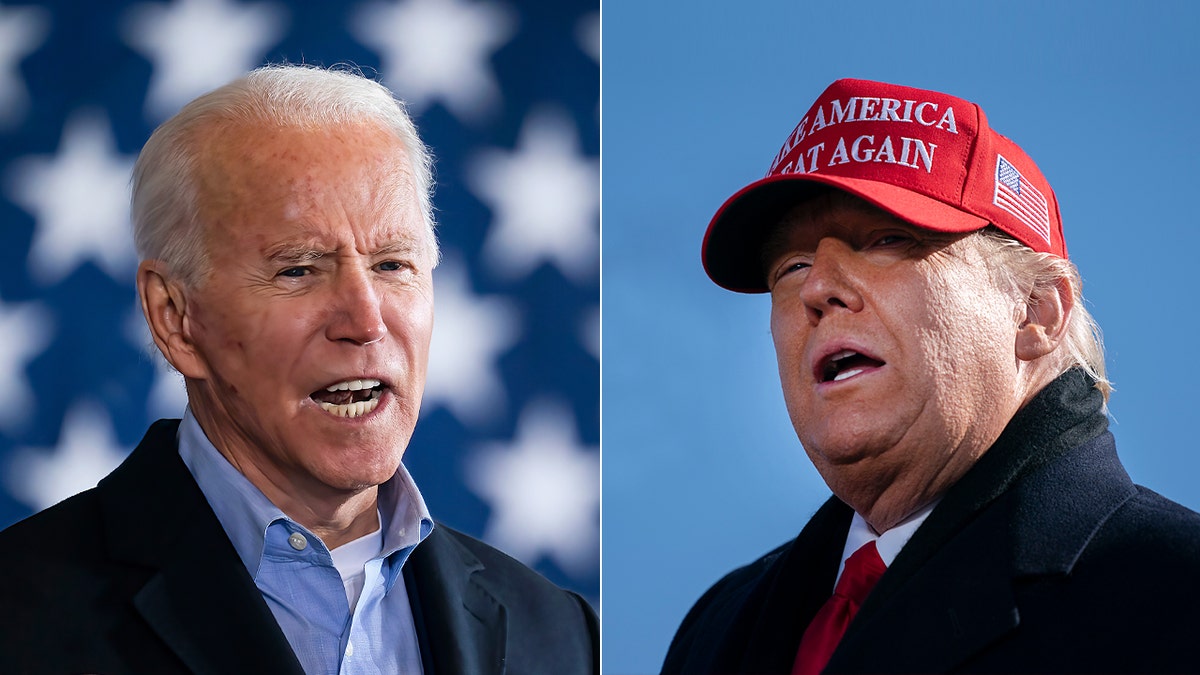Trump on potential violence and looting erupting following the election results
President Trump tells 'Fox & Friends' that he thinks 'it's very sad when stores are boarded up,' but understands why they do it.
A series of months punctuated by protests that, at times, devolved into unrest or riots have highlighted differences in the beliefs of President Trump and Democratic contender former Vice President Joe Biden when it comes to the role of law enforcement and criminal justice in America.
Protests following the deaths of multiple Black individuals nationwide, such as George Floyd in Minneapolis, Minn., Breonna Taylor in Louisville, Ky., and, most recently, Walter Wallace Jr. in Philadelphia, Pa., have called for police to be defunded or changes in police policy.
Trump, while campaigning last week in Arizona, expressed outrage over the violent protests in Philadelphia that followed Wallace Jr.'s death.

(Getty Images)
“I can tell you, Biden and Harris stand with the rioters and the vandals,” Trump said of Biden and his running mate, Sen. Kamala Harris, during a campaign rally. “I stand with the heroes of law.”
Meanwhile, the Biden campaign issued a joint statement in which Biden and Harris said that Wallace's was “a Black life that mattered.”
But where do Trump and Biden stand on the larger issues of policing and criminal justice reform? Public statements, debate comments and their own websites shed some light on the topic.
BIDEN

Democratic presidential candidate former Vice President Joe Biden speaks at a "Souls to the Polls" drive-in rally at Sharon Baptist Church, Sunday, Nov. 1, 2020, in Philadelphia. (AP Photo/Andrew Harnik)
Policing
In June, more than four dozen progressive groups signed a letter addressed to Biden’s campaign criticizing his police reform proposals and warning that if he doesn’t adopt more progressive policies he risks losing Black voters — and the election.
Biden, unlike many of his more liberal counterparts, has said he does not support defunding the police, but instead wants to "reimagine policing" — as he touted during the first presidential debate in September.
"What I support is the police having the opportunity to deal with the problems they face,” he said, later adding that local law enforcement "need more assistance, they need — when they show up for a 911 call, to have someone with them as a psychologist, a psychiatrist to keep them from having to use force and be able to talk people down."

(Seattle Police Department)
The former vice president has repeatedly made clear he would boost money for social services and condition federal dollars on police adhering to standards of decency.
“I don’t support defunding the police,“ Biden said in a CBS interview. But he said he would support tying federal aid to police based on whether “they meet certain basic standards of decency, honorableness and, in fact, are able to demonstrate they can protect the community, everybody in the community.”
His agenda also includes hiring additional officers to ensure that departments are racially and ethnically reflective of the populations they serve. He has also said he would increase oversight of police departments.
One of Biden’s priorities, spokesperson Andrew Bates told the Associated Press, is to “improve relationships between officers and residents.”
Biden has faced skepticism from some for his role in the 1994 federal crime law. The measure included federal money for the kind of community-policing Biden champions, but it also helped states build more prisons and toughened federal sentencing laws in ways that Biden and others now acknowledge disproportionately hurt Black and other non-White defendants.
CELEBRITIES VOTING FOR THE FIRST TIME IN THE 2020 PRESIDENTIAL ELECTION
Criminal Justice Reform
Biden’s “Plan for Strengthening America’s Commitment to Justice” emphasizes, in part, the campaign’s belief that “too many people,” especially Black and Brown individuals, are being held in U.S. jails and prisons, the campaign website states.
“To build safe and healthy communities, we need to rethink who we’re sending to jail, how we treat those in jail, and how we help them get the health care, education, jobs, and housing they need to successfully rejoin society after they serve their time,” the website states.
The plan’s “core principles” include decreasing the number of those who are behind bars while simultaneously reducing crime. People should not be in jail or prison for drug offenses alone, the plan states, but should rather be “diverted to drug courts and treatment.”
The plan also emphasizes the need to “root out the racial, gender and income-based disparities in the system” and provide the opportunities for previously incarcerated people to have second changes that could allow them to, in turn, contributed to the economy.
TRUMP

President Trump arrives for a campaign rally at Michigan Sports Stars Park, Sunday, Nov. 1, 2020, in Washington, Mich. (AP Photo/Evan Vucci)
Policing
President Trump has touted the “law and order” platform that arose largely out of the unrest in the wake of the unrest of the past several months.
Police unions nationwide have largely supported Trump’s reelection, and some publicly endorsed a political candidate for the first time.
The Fraternal Order of Police, a national coalition of unions that represents close to 350,000 officers, announced its endorsement in September. On the more local level, New York City’s Police Benevolent Association, the largest union representing members of the NYPD, issued its first presidential endorsement in at least 36 years.
In June, Trump signed an executive order that would give police departments a financial incentive to adopt best practices and encourage programs in which social workers join police when they respond to nonviolent calls involving mental health, addiction and homelessness issues.
The president’s executive order also required the attorney general to create a database tracking terminations, criminal convictions and civil judgments against law enforcement officers for excessive use of force. It encourages participation by providing certain grants only to those agencies that submit the required information.
As of Nov. 1., Trump had commuted 16 individuals’ sentences and pardoned 28 others, according to Politico.
Criminal Justice Reform
In 2018, Trump signed the First Step Act, which gave judges more discretion in sentencing, eased mandatory minimum sentences and encouraged inmates to participate in programs that aimed to reduce recidivism. As part of the criminal justice overhaul, the Bureau of Prisons released more than 3,100 federal inmates.
The Trump administration has promoted the overhaul as a rare bipartisan effort to address concerns that too many Americans were imprisoned for nonviolent crimes as a result of the drug war.
Trump resumed federal executions after a nearly 20-year hiatus.
CLICK HERE TO GET THE FOX NEWS APP
The Associated Press contributed to this report.













































